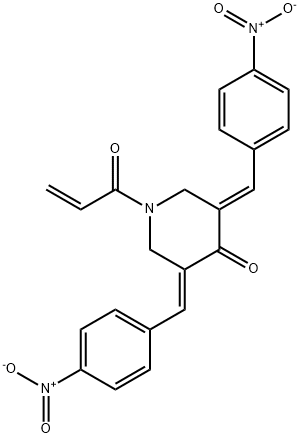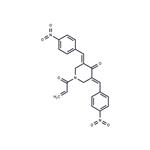b-AP15 (1009817-63-3) abrogates the deubiquitinating activity of the 19S regulatory particle by inhibiting ubiquitin C-terminal hydrolase 5 (UCHL5) and ubiquitin-specific peptidase 14 (USP14) resulting in accumulation of polyubiquitin in cells. b-AP15 induces tumor cell apoptosis and tumor progression in four different solid tumor models in vivo.
(3E,5E)-1-Acryloyl-3,5-bis(4-nitrobenzylidene)piperidin-4-one is a candidate cytotoxic agent for malignant cells.
nsc 687852 blocked deubiquitylating activity of usp14 and uchl5 selectively without inhibiting proteasome activity. nsc 687852 decreased viability in multiple myeloma (mm) cell lines and patient mm cells, inhibited mm cell proliferation even in the presence of bone marrow stroma cells, and overcomed bortezomib resistance. anti-mm activity of nsc 687852 was associated with growth arrest through downregulating cdc2, cdc25c, and cyclin b1, as well as induction of caspase-dependent apoptosis and activation of unfolded protein response [1].
This deubiquitinase inhibitor (FW = 421.31 g/mol; CAS 1009817-63-3), also named 3,5-bis[(4-nitrophenyl)methylene]-1-(1-oxo-2-propen-1-yl)- (3E,5E)-4-piperidinone, targets two proteasome-associated ubiquitin carboxyl-terminal hydrolase-14, or USP14, and Ubiquitin Carboxyl-terminal Hydrolase isozyme L5 UCHL5, IC50 = 2.1 μM, resulting in a rapid accumulation of high-molecular-weight ubiquitin conjugates and functional shutdown of proteasome. Interestingly, b-AP15 displays several differences with respect to bortezomib including insensitivity to over-expression of the anti-apoptotic mediator Bcl-2 and anti-tumor activity in solid tumor models. Inhibition of DUBs blocked the processing and release of interleukin IL-1β in both mouse and human macrophages. DUB activity was necessary for inflammasome association as DUB inhibition also impaired ASC oligomerization and caspase-1 activation without directly blocking caspase- 1 activity. These data reveal the requirement for DUB activity in a key reaction of the innate immune response and highlight the therapeutic potential of DUB inhibitors for chronic auto-inflammatory diseases. (See also Bortezomib, Eeeyarestatin I)
in vivo studies using distinct human mm xenograft models showed that nsc 687852 was well tolerated, inhibited tumor growth, and prolonged mouse survival. combination of nsc 687852 with suberoylanilide hydroxamic acid, lenalidomide, or dexamethasone was found to induce synergistic anti-mm activity [1].
1) D’Arcy et al. (2011), Inhibition of proteasome deubiquitinating activity as a new cancer therapy; Nature Medicine, 17 1636

